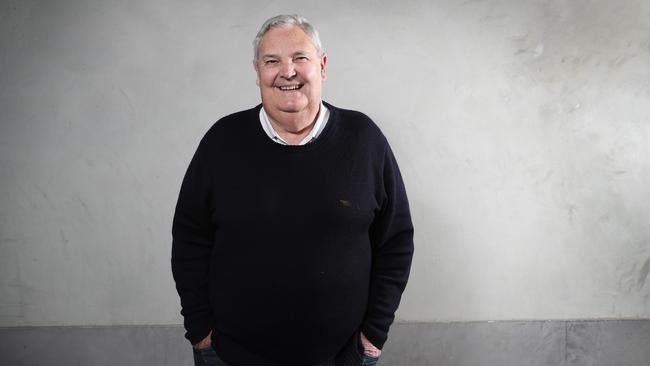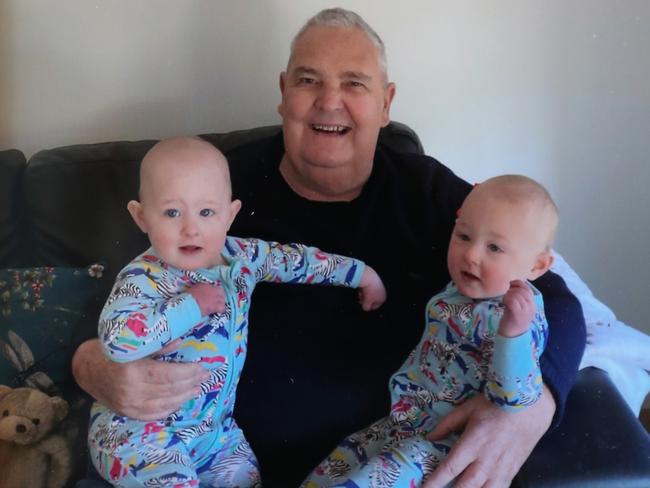New prostate cancer treatment helping patients live longer, better
A treatment that could allow advanced prostate cancer patients to avoid chemotherapy and live longer has arrived – but there’s a catch.

National
Don't miss out on the headlines from National. Followed categories will be added to My News.
Exclusive: A revolutionary treatment that can target cells “no bigger than the size of a grain of rice” could allow patients with advanced prostate cancer to avoid chemotherapy and live longer with a better quality of life.
Australian researchers and charity organisations like Movember were integral in the development of Lutetium PSMA (Lu-PSMA) – but the treatment is not yet approved or funded in the country.
It allows radioactivity to be delivered to extremely localised areas within the body, to target cancer cells measuring just 1mm in diameter in some cases, causing less harm to surrounding healthy tissue.
This is a crucial advancement from more toxic treatments like chemotherapy and radiation, which can cause severe ongoing side effects like fatigue, nausea, vomiting, diarrhoea and impacts to sexual function and fertility.
Jane Fisher, Movember’s global director of cancer research and clinical trials, said Lu-PSMA had been shown to “shrink cancer cells, improve pain, delay the time it takes for cancer to grow again, improve quality of life, and help men live longer lives”, with “minimal side-effects”.
“Globally, this is considered to be one of the biggest advances in the management of prostate cancer,” she said.
“With chemotherapy, there’s so much lethargy and nausea. But with Lu-PSMA, there are fewer side effects so they have the opportunity to get out and mow the lawn, spend time with their grandkids, play a round of golf.
“They get that quality of life back.”

Fifty men with advanced prostate cancer who had exhausted all treatment options took part in the first Lu-PSMA clinical trial at Melbourne’s Peter MacCallum Cancer Centre in 2015.
Its success led to a second trial run at 11 sites across Australia and involving 200 patients. Results found most patients on Lu-PSMA had better response rates, fewer adverse side effects and better quality of life, and that it took longer for cancer to reoccur compared to chemotherapy medication.
The trials were largely philanthropically funded by organisations like Movember and the Prostate Cancer Foundation of Australia.
The US’s Food and Drug Administration approved Lu-PSMA in March. But Ms Fisher said despite Australian researchers doing “the heavy lifting” in developing the treatment, it was only available here in some hospitals on clinical trials, in compassionate cases, or in private health centres at a cost of about $10,000 per round.
A full course of six cycles can set patients back $60,000.
Ms Fisher said Movember was now working with the Federal Government, the Australasian Association of Nuclear Medicine Specialists and advisory groups to help get the lifesaving care on to a Medicare Benefit listing so more Australian men could access it.
Peter MacCallum Cancer Centre director of prostate cancer theranostics and imaging Professor Michael Hofman, who was integral in the Lu-PSMA research, said there was “an urgent need to provide funding for PSMA therapy”.
“(It) not only improves the longevity of life for men living with prostate cancer but also their quality of life,” he said.
The Australian Nuclear Science and Technology Organisation makes Lu-PSMA in Australia, where one in five men will be diagnosed with prostate cancer in their lifetime.
In July, the Australian Government funded PSMA PET scan imaging through Medicare for high-risk prostate cancer patients, meaning they no longer have to incur significant costs for a test.
Prof Hoffman praised this outcome, noting the technology had “revolutionised the way prostate cancer is detected and identified within the body”.
Ms Fisher said donations from dedicated fundraisers had allowed Movember support the development of Lu-PSMA and PSMA PET scan imaging.
The Melbourne-born charity has invested more than $623m into prostate cancer research and development globally since 2003.
“We’re seeing fundraisers’ money really make a difference on a global scale,” she said.

Treatment giving Melbourne grandfather more time
Since being diagnosed with prostate cancer in 1999, Rob Baker has had 10 operations and a host of other treatments, including hormone implants and injections, radiation and chemotherapy.
This has come at a cost of “hundreds of thousands of dollars” to him and his wife of 53 years, Pat, and “a lot of side effects”.
“I’ve got snakes and ladders all over me,” he said.
But receiving the Lu-PSMA treatment at the Peter MacCallum Cancer Centre has given the 74-year-old grandfather renewed hope.
From December 3 last year, Mr Baker received six rounds of Lu-PSMA about six weeks apart, cutting his Prostate-Specific Antigen (PSA) levels from a dangerously high point in the 200s down to 1.7.
“The scan from December 3 (shows) cancerous cells were scattered throughout my body,” he said. “But there were virtually none you could see after the last treatment.”

Mr Baker said five months on from his last treatment, his PSA levels had increased to 3.9 and he expected them to continue to do so. But the wonderful Peter Mac team had ensured him they would “continue to look after me” with further treatment.
“I wish that this had been available 24 years ago,” Mr Baker said of Lu-PSMA.
“It’s already added 12 months to my existence. I can’t see why this can’t give me another five years.
“I don’t want to die. I’m not ready yet.”
While the treatment has left him fatigued and with a dry mouth and eyes, Mr Baker is loving spending time with his five grandchildren.
He is also optimistic Lu-PSA will become more readily available to Australians in the near future.
In the meantime, he’s determined to use his experience to help others, noting: “My attitude is, if I can help one bloke go and get tested, my job’s done.”



